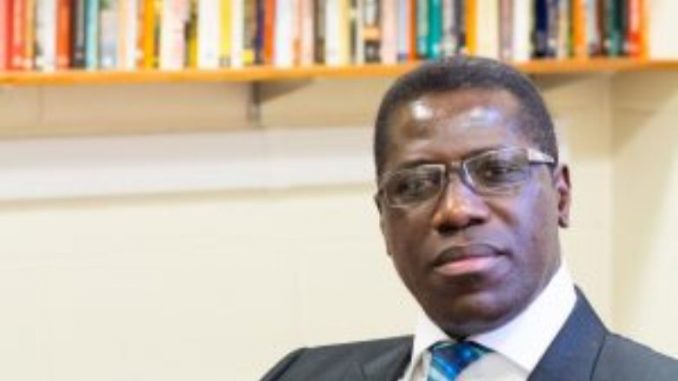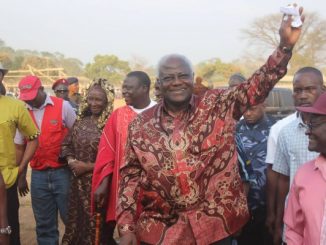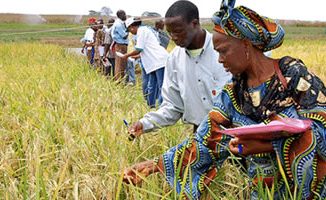
Office of the Chief Minister Ministry of Political and
Sierra Leone Public Affairs
FINAL COMMUNIQUE ISSUED AT THE END OF THE THREE DAY
CONSULTATIVE NATIONAL DIALOGUE ON DEMOCRATIC
CONSOLIDATION FOR PEACE AND NATIONAL COHESION IN SIERRA LEONE: BINTUMANI III. FREETOWN, BINTUMANI CONFERENCE CENTRE, 23-25 MAY 2019.
Background
The 2004 Truth and Reconciliation Commission Report noted that one of the key reasons for the brutal civil war of the 1990s was the lack of “a culture of tolerance and inclusion in political discourse.” The report also deplored ethnically driven politics, exclusion and patrimony.
At the State Opening of Parliament on 10 May 2018, His Excellency, President Julius Maada Bio acknowledged that “national cohesion and the feeling of belonging of all citizens have gravely crumbled” and that there is a need, “to promote unity and national cohesion.” President Bio then launched a Presidential Initiative and proposed the creation of “an Independent Commission for Peace and National Cohesion to be established by an Act of Parliament.”
The Government produced a consultative Green Paper as a consultative document to be used by citizens, political, religious, civil society leaders and other stakeholders. The Green Paper raised pertinent national issues and suggested a structure, composition, mandate, and possible funding sources of the commission for further public deliberation.
Following the production of the Green Paper, various stakeholders held a series of thematic consultations in various parts of the country. Women, civil society groups, persons with disabilities, youth, children, the Inter-Religious Council, and Paramount Chiefs presented position papers identifying key issues relevant to national peace and cohesion. International and sub-regional partners also underscored the need for the timely management of political disagreements, grievances and conflict.
Between 23rd and 25th May 2019, the Government and citizens of Sierra Leone, international experts, development partners and members of the diplomatic corps met at the Bintumani Conference Centre in Freetown for a consultative conference on peace and national cohesion.
Key Issues and Agreements
In speeches, position papers presented, panel discussions, audience contributions, participants raised the following key issues:
1. Participants were concerned about the following:
a. Lack of political will to implement progressive citizen-centred recommendations from past national consultative processes including Truth and Reconciliation Commission Report of 2004 and Constitutional Review Committee 2016;
b. Misuse, abuse, and weak oversight of governance processes;
c. Lack of accountability and transparency;
d. Poor public service delivery;
e. Unfair, inequitable, unrepresentative and unjust allocation of public resources;
f. Lack of representation or inclusion of women, children, youth, persons with disabilities across all spheres;
g. Unfairness and unrepresentative employment practices;
h. Breaches of the Constitution and the lack of access to speedy and fair justice;
i. Discriminatory access to land and natural resources;
j. Inflammatory and hate speech; and,
k. Failures of decentralisation
2. Participants emphasized the urgent need to institutionalise practices and processes that ensure fairness, equity and justice;
3. Participants reached broad consensus that diversity management and national cohesion are necessary for inclusive and sustainable national development, and for consolidating and deepening our democratic gains as a nation.
4. Participants agreed that the government must establish a statutory, independent, inclusive, people-centred, national infrastructure to address issues pertaining to peace and national cohesion.
5. Participants affirmed that the institution’s mandate must not overlap with those of existing institutions and could include the following three broad areas:
a. Conflict Prevention
i. Develop a localised early warning system including technology mediated and data-driven early warning interventions for identifying, registering, managing grievance and conflict;
ii. Develop an effective monitoring process;
iii. Conduct civic and peace education;
iv. Undertake advocacy, media and communications as a preventive strategy;
v. Further capacity building and monitoring of institutions to ensure effective diversity management;
vi. Conduct research and diversity audits of all institutions.
b. Conflict Management
i. Monitor compliance (practices, processes, resource allocation, service delivery);
ii. Investigate and report;
iii. Engage stakeholders as necessary to defuse and manage conflict;
iv. Maintain institutional oversight for diversity and diversity in its management processes thereby ensuring institutional effectiveness;
v. Promote affirmative actions/policies for access, resource allocation, and representation;
vi. Undertake all other ancillary functions;
c. Public Education about Peace and Conflict Prevention
i. Be responsible for public/stakeholder education on various issues relevant to its mandate;
ii. Train various stakeholder groups on recognition, negotiation, resolution strategies;
iii. Promote trust and confidence in public institutions and governance processes;
iv. In collaboration with other institutions, educate citizens on their rights, responsibilities and opportunities;
v. Manage media and communications including cultural and community-specific engagements on peace and social cohesion and;
vi. Collaborate with other state and non-state actors in promoting activities that foster peace and national cohesion including sports, community and youth groups, cultural organisations.
6. Having heard about the Rwandan and Kenyan models with respect to the structure of the Commission, participants urged the government to also consider African models in order to develop an institution that is best suited to the Sierra Leone situation;
7. Participants emphasised that the institution should be nationally-owned, managed and run; its independence and inclusivity (gender, age, disability, geography among others) guaranteed in law and it must have a decentralised structure down to chiefdom level.
8. Participants stated that there is a need to include the Commission’s representatives in all existing security and justice sector coordinating groups and to strengthen relationships with public, private, non-state actors and Sierra Leoneans in the Diaspora;
9. Participants also stressed that the staff of the proposed Commission shall have no active political affiliation, should be competent persons with relevant experience appointed on merit, shall have security of tenure, and must be persons of high public probity;
10. Participants agreed that the Government should adequately fund the Commission (although the commission could seek support from other sources for specific projects) and that Parliament should guarantee adequate and earmarked budgetary support on an annual basis to ensure the effective functioning of the commission; and,
11. Participants further agreed that the commission should be subjected to periodic structural, performance and activity audits.
Other Issues Relevant to the Commission’s Mandate
The participants at the consultative conference also highlighted the need for the following:
a) Implementing outstanding Truth and Recommendation Commission Report recommendations and to ensure that existing relevant institutions and processes are effectively executed;
b) Re-visiting, adopting, and effectively implementing the recommendations of the Constitutional Review Committee;
c) Enacting legislation for a predictable election timetable (fixed dates), a transparent post-election political transition process, and reviewing the role of paramount chiefs in the national legislature; and,
d) Addressing equity, fairness, inclusion, representation for women and all other marginalised and disadvantaged groups.
Conclusion
The participants expressed their satisfaction that this conference is the start of an inclusive, Sierra Leone-owned process that will lead to the prevention and management of grievance and conflict, the fostering of peace, and the consolidation of democracy in Sierra Leone.



